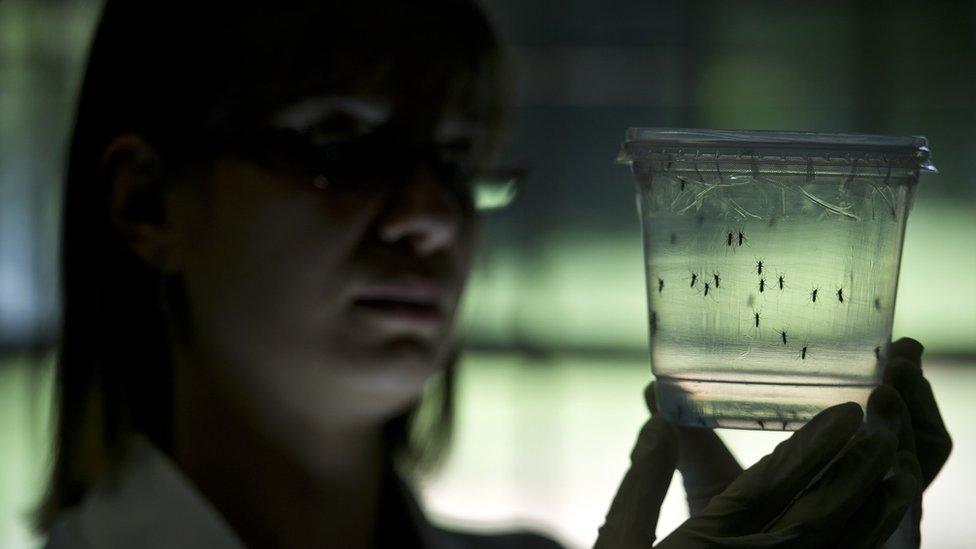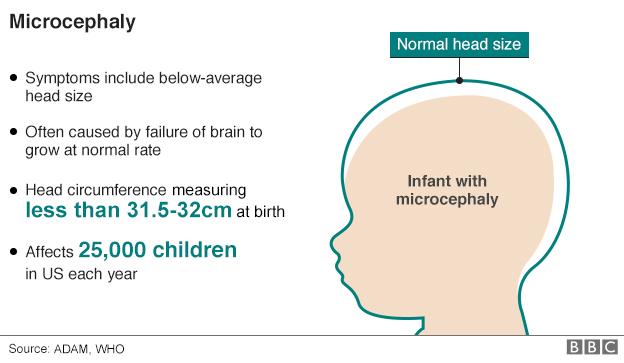Zika virus: Three Britons infected, say health officials
- Published

The virus is transmitted through mosquito bites
Three Britons have contracted Zika virus - which may cause severe birth defects - after travelling to South and Central America, officials have said.
The three people became infected with the illness through mosquito bites in Colombia, Suriname and Guyana, Public Health England (PHE) confirmed.
Pregnant women have been warned not to travel to countries where Zika has been reported.
The virus is not contagious and can be passed on through mosquito bites.
Zika "is not spread directly from person to person", according to official guidance issued by PHE., external
Read more: The alarming threat of Zika virus
However, the advice continues, "a small number of cases have occurred through sexual transmission or by transmission from mother to foetus via the placenta."

What is Zika virus?

Babies born with abnormally small heads may face lifelong difficulties
It is spread by the Aedes aegypti mosquito, which also carries dengue fever and yellow fever
It was first discovered in Africa in the 1940s but is now spreading in Latin America
Scientists say there is growing evidence of a link to microcephaly, that leads to babies being born with small heads
While Zika virus can lead to fever and a rash, most people show no symptoms, and there is no known cure
The only way to fight Zika is to clear stagnant water where mosquitoes breed, and to protect against mosquito bites

Meanwhile, Colombia, Ecuador, El Salvador and Jamaica advised women to delay pregnancies until more was known about the mosquito-borne virus.
This followed an outbreak in Brazil, where the authorities reported that the number of babies born with suspected microcephaly - or abnormally small heads - had reached nearly 4,000 since October.
And in the US, health authorities have warned pregnant women to avoid travelling to more than 20 countries in the Americas and beyond, where Zika cases have been registered.
Female mosquito
The link between microcephaly and Zika has not been confirmed - but a small number of babies who died had the virus in their brain and no other explanation for the surge in microcephaly has been suggested.
Dr Alain Cole from the University of Glasgow told BBC News there was "mounting circumstantial evidence" Zika could be linked to microcephaly.
"Probably the majority of people will not even realise they are infected [with Zika]. Only about 20% of people will develop symptoms - and these symptoms are mild," he added.

Prof Trudie Lang said more research needed to be done
Meanwhile, Prof Trudie Lang from the University of Oxford said the scientists needed to understand why Zika was "picking up like this".
She said: "What seems to be happening is it's crossing into unborn babies, and causing this problem... but we really don't know, and we need to do more research."
Zika is transmitted by the bite of an infected female Aedes mosquito. The Aedes is not present in the UK, as the temperature is not consistently high enough for it to breed, PHE said.
The US Centers for Disease Control and Prevention issued initial travel warnings to pregnant women last week, adding eight more places to the list on Friday. The warnings now extend to:
Central and South America: Bolivia, Ecuador, Guyana, Brazil, Colombia, El Salvador, French Guiana, Guatemala, Honduras, Mexico, Panama, Paraguay, Suriname, Venezuela
Caribbean: Barbados, Saint Martin, Haiti, Martinique, Puerto Rico, Guadeloupe
Oceania: Samoa
Africa: Cape Verde

- Published23 January 2016
